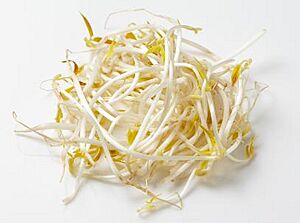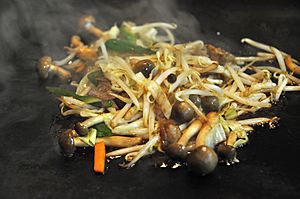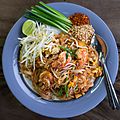Mung bean sprout facts for kids
Quick facts for kids Mung bean sprout |
|||||||||||||
|---|---|---|---|---|---|---|---|---|---|---|---|---|---|
 |
|||||||||||||
| Chinese name (Mandarin, Taiwanese) | |||||||||||||
| Traditional Chinese | 豆芽 | ||||||||||||
| Simplified Chinese | 豆芽 | ||||||||||||
| Literal meaning | Bean sprout | ||||||||||||
|
|||||||||||||
| Chinese name (Mandarin) | |||||||||||||
| Traditional Chinese | 綠豆芽 | ||||||||||||
| Simplified Chinese | 绿豆芽 | ||||||||||||
| Literal meaning | Green bean sprout | ||||||||||||
|
|||||||||||||
| Chinese name (Cantonese) | |||||||||||||
| Chinese | 芽菜 | ||||||||||||
|
|||||||||||||
| Chinese name (Taiwanese) | |||||||||||||
| Chinese | 豆菜 | ||||||||||||
|
|||||||||||||
| Vietnamese name | |||||||||||||
| Vietnamese | giá đỗ, giá đỗ xanh |
||||||||||||
| Thai name | |||||||||||||
| Thai | ถั่วงอก | ||||||||||||
| RTGS | thua ngok | ||||||||||||
| Korean name | |||||||||||||
| Hangul | 숙주나물 | ||||||||||||
| Literal meaning | Sukju namul | ||||||||||||
|
|||||||||||||
| Japanese name | |||||||||||||
| Kanji | 萌やし | ||||||||||||
| Kana | もやし | ||||||||||||
|
|||||||||||||
| Malay name | |||||||||||||
| Malay | tauge, tauge halus |
||||||||||||
| Indonesian name | |||||||||||||
| Indonesian | kecambah, kecambah kacang hijau, taoge |
||||||||||||
| Filipino name | |||||||||||||
| Tagalog | toge | ||||||||||||
| Khmer name | |||||||||||||
| Khmer | សណ្ដែកបណ្ដុះ sândêkbândŏh | ||||||||||||
Mung bean sprouts are a type of vegetable grown from mung beans. They are made by letting the beans sprout, which means they start to grow tiny shoots. You can grow them by keeping the beans in a dark place and giving them water. The sprouts grow long, white stems called hypocotyls.
Mung bean sprouts are very popular in East Asia and Southeast Asia. They are easy to grow and don't need much care, just enough water. Because they are so simple to grow, they are often used in school science projects!
Contents
How to Grow Mung Bean Sprouts
There are many ways to grow mung bean sprouts. A popular method for growing them at home is to use a jar. You put the beans in the jar and cover the top with a fine mesh or a piece of cloth, held in place with a rubber band.
You need to pour fresh water into the jar about three to four times a day. After watering, you turn the jar upside down to let all the water drain out. This helps the sprouts grow well without getting too wet.
The most important things for growing good sprouts are:
- Choosing fresh, healthy mung beans.
- Making sure the beans get enough moisture.
- Keeping the beans from sitting in too much water.
Mung Bean Sprouts in Cooking
Mung bean sprouts are a tasty addition to many dishes. You can cook them quickly in a microwave or stir-fry them in a pan. They are also a common ingredient in dishes like spring rolls.
Chinese Dishes
In Chinese cooking, mung bean sprouts are called dòuyá (豆芽). They are often used in popular dishes such as fried rice, spring rolls, egg drop soup, and hot and sour soup.
In Cantonese cooking, which is a style from southern China, bean sprouts are found in dishes like egg fu yung and beef chow fun.
-
Stir-fried turnip cake with mung bean sprouts.
Indian Dishes
In Indian cuisine, especially in the state of Maharashtra, mung bean sprouts are used in a spicy dish called Usal. This dish often balances the heat of curry with the fresh taste of mung beans or sprouts.
-
A spicy curry called Usal with sev and mung beans.
Japanese Dishes
In Japanese cuisine, mung bean sprouts are known as moyashi (もやし). They are a very common ingredient in many Japanese meals. You'll find them in stir-fries and different kinds of soups.
-
Ramen noodles often have mung bean sprouts as a topping.
Korean Dishes
In Korean cuisine, mung bean sprouts are called sukjunamul (숙주나물). This name refers to both the sprouts themselves and a seasoned vegetable dish made from them. While not as common as soybean sprouts, mung bean sprouts are used in dishes like bibimbap, in the fillings of dumplings, and in sundae (Korean sausage).
Nepalese Dishes
In Nepalese cuisine, mung bean sprouts are a key ingredient in kwati. This is a special soup made from nine different types of sprouted beans. Kwati is often prepared for the Janai Purnima festival, which usually happens in August.
To make Kwati, people fry and mix ingredients like onion, garlic, ginger, potatoes, spices, and various bean sprouts, including mung bean sprouts. There are many ways to make it, but it's always considered a very healthy and nutritious food in Nepal. Kwati is usually eaten with rice, and sometimes fried goat meat is added for extra flavor.
Thai Dishes
In Thai cuisine, mung bean sprouts are often found in soups and stir-fried dishes. For example, in pad thai, they are usually added to the pan for just a quick stir right before the dish is served. In soups like nam ngiao, mung bean sprouts are sprinkled on top as a garnish.
-
Pad thai is often served with fresh mung bean sprouts.
-
Nam ngiao, a Thai soup, with mung bean sprouts on top.
Indonesian Dishes
Mung bean sprouts are widely used in Indonesian cuisine. They often go with soup dishes such as rawon, mie celor, or soto. They are also mixed into Indonesian vegetable salads like pecel, karedok, or gado-gado. Another popular way to eat them is stir-fried, as in tauge goreng.
-
Tauge goreng is a stir-fried mung bean sprout dish.
-
Karedok is a salad made with raw vegetables, including sprouts.
-
Mie celor is a soupy noodle dish from Palembang that uses sprouts.
Vietnamese Dishes
-
Phở noodles are often served with mung bean sprouts as a topping.
See also
 In Spanish: Brote de soja verde para niños
In Spanish: Brote de soja verde para niños
 | Percy Lavon Julian |
 | Katherine Johnson |
 | George Washington Carver |
 | Annie Easley |














